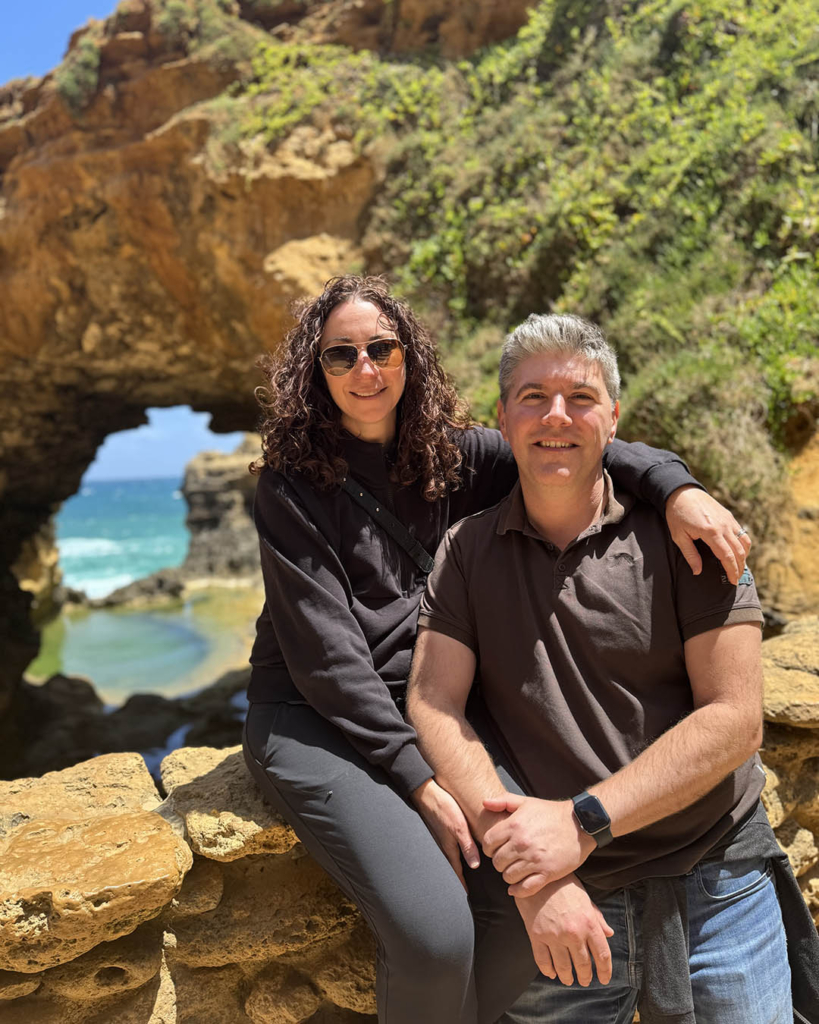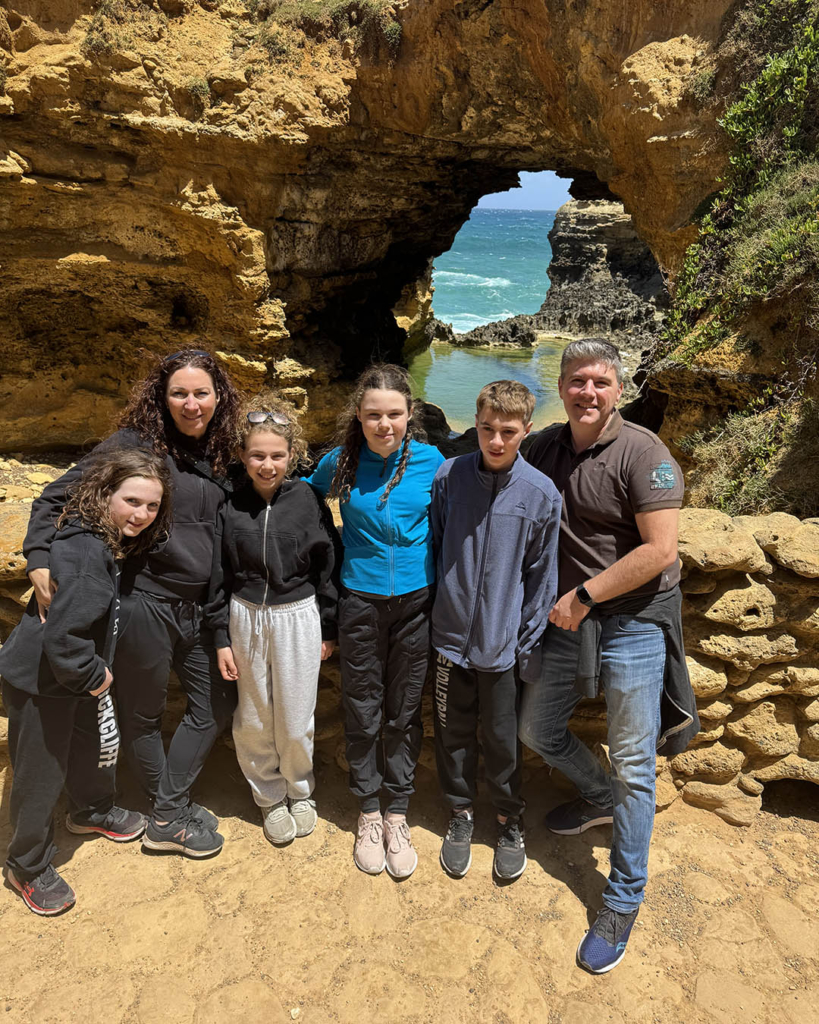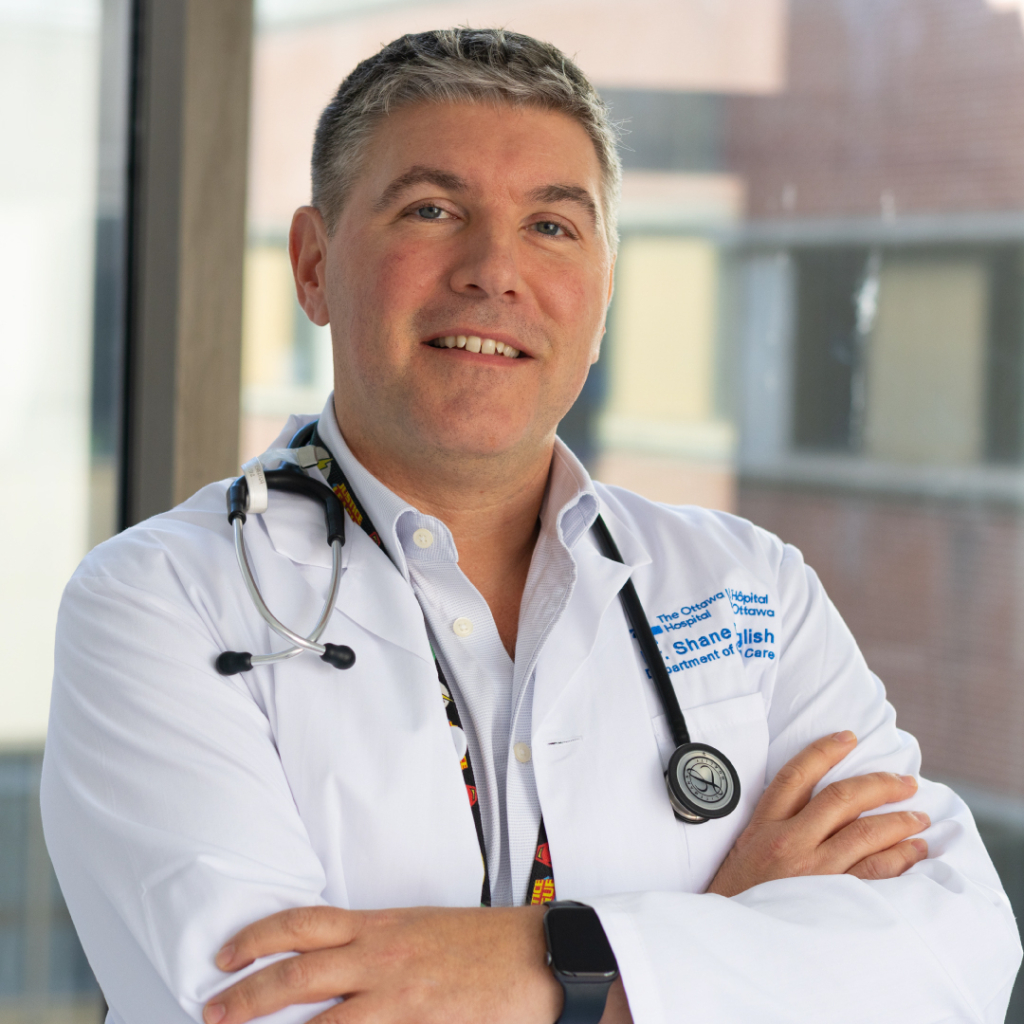
Dr. Shane English’s children might not think he’s a real doctor, but the experts disagree.
The Senior Scientist at The Ottawa Hospital has won the 2025 Chrétien Researcher of the Year Award for his practice-changing research into subarachnoid hemorrhage, a devastating form of stroke with life-altering effects and high costs to the healthcare system. Whether he’s delivering acute care at the bedside or changing the way that care is delivered through his research, Dr. English is transforming our understanding of this condition to improve patient outcomes.
Find out whether Dr. English’s study proved his hypothesis, how it affects patients today, and what his “side hustle” is thanks to his kids.
Q: Can you tell us a bit about your early years?
A: My father was a banker, so I lived in a few different places. I spent my formative years in the Ottawa Valley, moved to Sudbury before high school, and then wound up going to Laurentian University for biochemistry.
I had always gravitated towards science and math, and English was the class I hated the most, next to history or geography — it’s a bit of a toss-up.
Q: What did you want to be when you grew up?
A: I remember wanting to be a veterinarian at one time or another. But I’ve also thought I might want to be a lawyer and, at another point, a pilot. I’d actually still do either of those things given the opportunity.
Q: When did you decide you wanted to pursue medicine?
A: Due to various life circumstances, including family members who had encounters with the healthcare system, I found myself visiting people in the hospital from a pretty young age, and I was always intrigued with the environment. For almost as long as I can remember, being a doctor became a really big goal in my life.
When I finished my undergrad, I moved back to the Ottawa area to go to the University of Ottawa for medical school.
Q: How did you wind up in critical care specifically?
A: During university, I volunteered at the local hospital in Sudbury and spent a lot of time in the Emergency Department, and that exposure ignited my passion.
It was tough because every subject I took in med school, and every rotation, wound up being something I could see myself doing. But acute care spoke to my interest in critically ill patients and the quick action needed to intervene in these scenarios. I loved how acute care responded to the complexities of multi-organ involvement and multi-system diseases, how there were various systems at play, and how it would involve more continuity with patients.
I also did an early elective in an ICU where they were doing all these unique, nifty things that were so outside of the box, and I became very passionate about it. I did a neurocritical care fellowship at Cambridge in the UK, pursuing the clinical and research side.
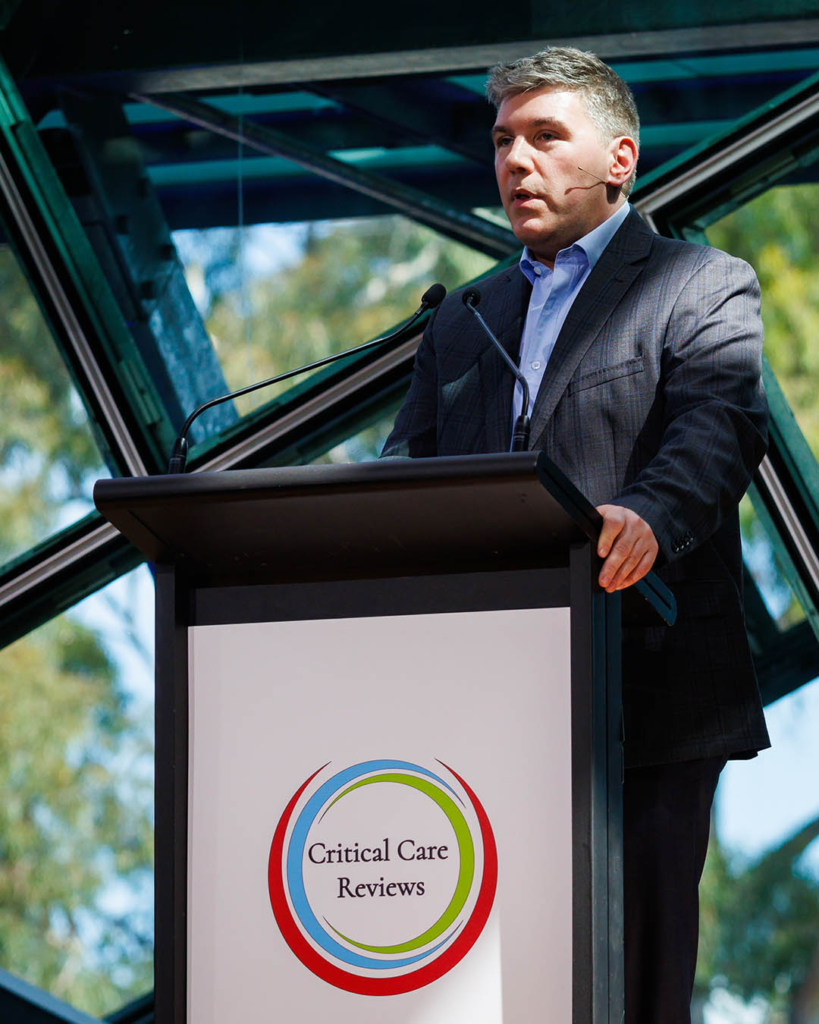
Q: When did you shift into doing research as well as clinical work?
“There are more ways to influence patient care than just at the bedside.”
— Dr. Shane English
A: That was actually completely by luck. During my training, I would have told you I never, ever wanted to do research. But then I had an early mentor in my critical care training, Dr. Lauralyn McIntyre, who saw my potential and encouraged me to get involved in a project. It was a systematic review, and she shepherded me through starting, publishing, and presenting at a conference. It felt like a whole lot of work, but the reward that came at the end was worth it. It showed me there are more ways to influence patient care than just at the bedside.
Incrementally, inch by inch, I became more involved and became enamored by the fact that there was this bigger role to play.
Q: Do you have any unusual strengths or fears?
A: I’m not a big risk taker, but I don’t like being left behind. So that’s a weird juxtaposition, but it gives me the strength to do the things I’m scared of. For example, I’m height-averse for sure, but I love roller coasters, and I’ve had the opportunity to do some mountain climbing — I just didn’t look down!
Q: What exactly do you research?
A: My most recent research was a large trial we published last year in the New England Journal of Medicine, called the SAHARA randomized controlled trial. It focused on a very specific disease process called subarachnoid hemorrhage, which is mostly due to an aneurysm rupturing, allowing blood to leak into the brain. Most strokes are ischemic strokes, caused by a blockage of blood to the brain, which is quite different.
Subarachnoid hemorrhage has been my area of focus for almost 15 years, and I find it rewarding for a few reasons: people affected tend to be much younger than typical stroke patients, they don’t usually have the same comorbidities as other stroke patients, and without warning they have a cataclysmic event that alters the rest of their lives in seconds. Out of the two-thirds who survive, they often go on to have a really complicated acute care period in the hospital and a recovery that lasts months or years — and they’re often left with significant physical or cognitive disabilities. Our research looked at how to best manage low hemoglobin levels in this patient group. We divided participants into two groups, and with one, we were very liberal in giving blood transfusions, while with the others, we were more restrictive.
Previous evidence suggested that allowing blood levels to fall quite far before doing a transfusion, which comes with its own risks, was the standard of care. We challenged that notion by hypothesizing that giving transfusions earlier might have better results. At the end of this long, multi-centre, international trial, we did not demonstrate one approach being better than the other. However, the findings suggested a potential benefit at 12 months with a liberal approach, but we didn’t achieve statistical significance to demonstrate that effect. However, two other trials were done at the same time, both with results similar to ours, suggesting liberal transfusions might be beneficial.
I think many would see our results and assume our hypothesis was incorrect or that we failed, but I think the beauty of research is that no single study is going to answer a question. Each study is going to expand our thinking on a subject. Together, the three trials suggest that our hypothesis might, in fact, be correct.
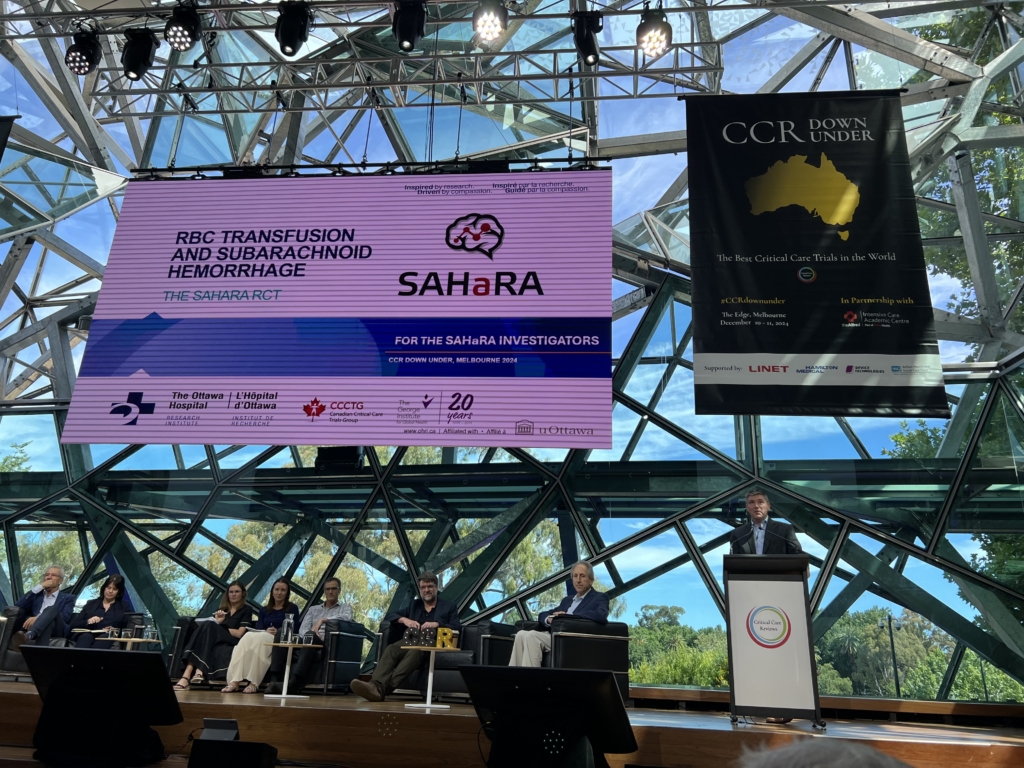
Q: How does your research impact patients today
A: My own interpretation of the study is that I’ve personally changed my practice to be more liberal with transfusions.
Overall, my research is often on everyday things we’re already doing. We’re taking those everyday questions and applying scientific rigour to them to provide the best guidance to improve outcomes for patients.
“Dr. English’s leadership, empathy and scientific rigour are helping shape a future in which individuals like myself, who have experienced the trauma of a brain aneurysm rupture, will no longer be left without answers or guidance. His work has the power to influence how global science approaches outcome measurement, improve the comparability and quality of future studies, and ultimately lead to more meaningful treatment options and support for survivors.”
— Dr. Leslie Miller
Q: How is The Ottawa Hospital pushing the boundaries of healthcare?
A: I think that as an institution, we should be really proud of the mark we have made in clinical medicine. For a “smallish city” academic centre, relative to many others, we punch above our weight, and as a researcher and clinician, I’m proud to be associated with the hospital and the work we do, which spans from basic science to clinical medicine and from acute care to chronic care. The work we’re doing, whether it’s with stem cells or immunotherapy, and the way scientific teams are improving patient care, is meaningful and impactful.
Q: How does it feel to win this award?
A: It’s both an honour and incredibly humbling to receive this award. Any success I may have achieved is truly on the shoulders of those who have brought me here; no one achieves this in a silo. Without my mentors, team, and certainly the patients, we would never be able to advance science. It’s the icing on the cake for this research and very unexpected.
“Shane exemplifies the qualities this award seeks to recognize through his groundbreaking research and unwavering commitment to advancing medical science.”
— Dr. Marc Carrier
Q: What’s something your family might not know about your job?
A: Well, my kids don’t think my wife and I are physicians — but we both are. We have four children, so it’s a pretty busy household, and if they get hurt, they’ll ask for a real doctor. I think they genuinely don’t believe we are, but I’m not sure what they think we do all day.
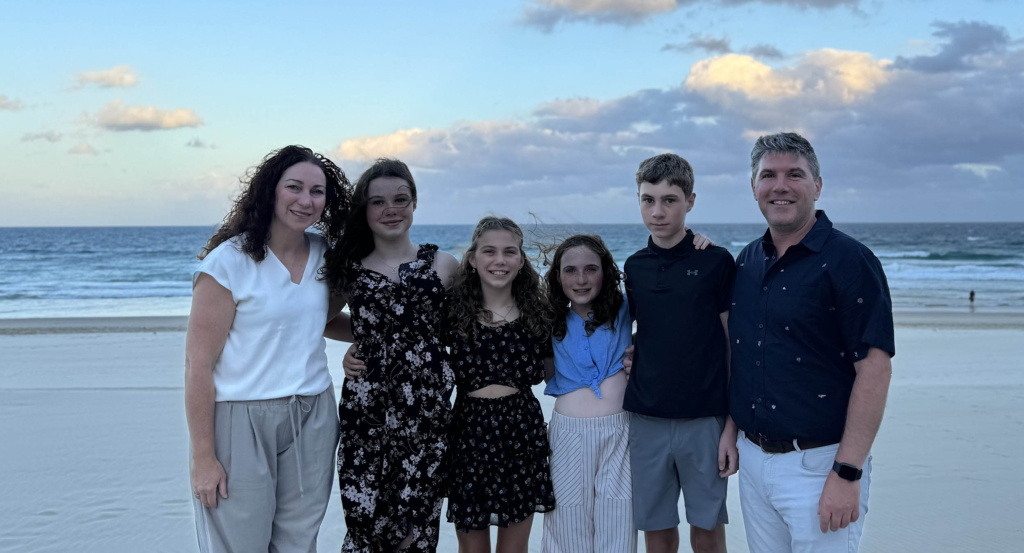
Q: What’s your favourite part of a day at work?
A: It’s the interactions. The team within which I work, whether it’s research or clinical, really makes the job fun and fulfilling. And I value the relationships I create with patients and their families so much.
Q: Where would we find you when you’re not at work?
A: Chasing after the kids. Our other full-time job is Ubering them around but without the pay. They’re 10 to 15 now, and it’s a whole lot of driving. But it’s also contained time with them, which has its values.
